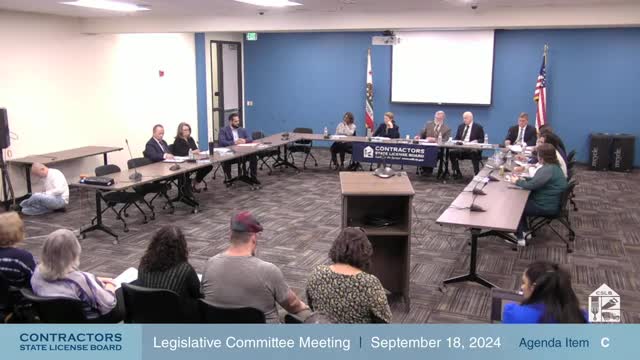Homeowners demand justice after $40 million tiny homes scam
September 20, 2024 | Contractors State License Board, Other State Agencies, Executive, California
This article was created by AI summarizing key points discussed. AI makes mistakes, so for full details and context, please refer to the video of the full meeting. Please report any errors so we can fix them. Report an error »

In a recent government meeting, a victim of Anchor Tiny Homes, who lost $40,000, voiced concerns about inadequate bond regulations for large-scale contractors. The individual highlighted that current laws fail to protect homeowners from long-term fraud, emphasizing the need for a more equitable bond system that reflects the financial stability of companies engaging in significant liabilities.
The speaker compared their experience as a therapist, where they were required to carry $1 million in liability insurance, to the minimal $25,000 bond required for large contractors. This disparity raised questions about the effectiveness of existing regulations in safeguarding consumers.
The discussion also touched on the potential for separate licensing for Accessory Dwelling Unit (ADU) builders, which was met with approval from the speaker. They advocated for closer monitoring of contracts and truthful marketing practices to ensure consumer protection.
Additionally, the speaker called for the establishment of a recovery fund to assist those affected by the Anchor Tiny Homes scandal, noting that approximately 1,000 individuals in a Facebook group they represent identified recovery funds as a top priority, followed closely by the need for prosecution of fraudulent practices.
The meeting underscored the urgent need for regulatory reform to address the vulnerabilities faced by consumers in the housing market, particularly in light of significant financial losses and insufficient legal recourse.
The speaker compared their experience as a therapist, where they were required to carry $1 million in liability insurance, to the minimal $25,000 bond required for large contractors. This disparity raised questions about the effectiveness of existing regulations in safeguarding consumers.
The discussion also touched on the potential for separate licensing for Accessory Dwelling Unit (ADU) builders, which was met with approval from the speaker. They advocated for closer monitoring of contracts and truthful marketing practices to ensure consumer protection.
Additionally, the speaker called for the establishment of a recovery fund to assist those affected by the Anchor Tiny Homes scandal, noting that approximately 1,000 individuals in a Facebook group they represent identified recovery funds as a top priority, followed closely by the need for prosecution of fraudulent practices.
The meeting underscored the urgent need for regulatory reform to address the vulnerabilities faced by consumers in the housing market, particularly in light of significant financial losses and insufficient legal recourse.
View full meeting
This article is based on a recent meeting—watch the full video and explore the complete transcript for deeper insights into the discussion.
View full meeting
